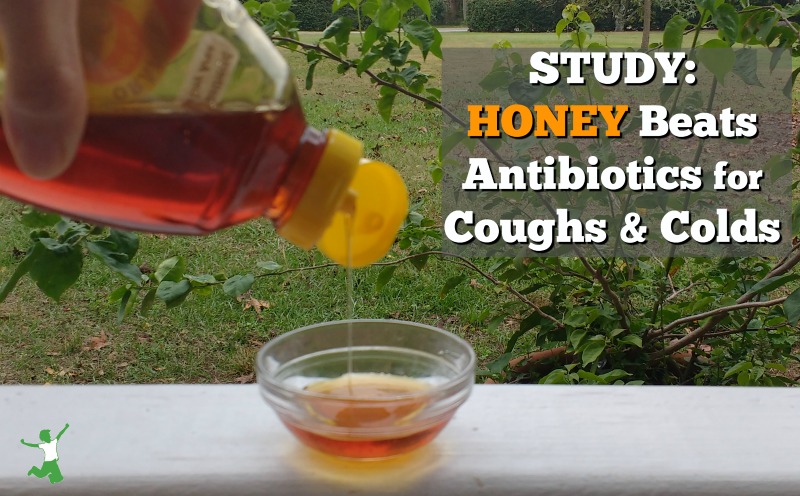Table of Contents[Hide][Show]

Coughs and colds from upper respiratory tract infections are the most frequent reason doctors write antibiotic prescriptions. This is the case despite the fact that most URTIs are viral in nature, rendering antibiotics useless. Worse, this practice contributes greatly to the massive, worldwide problem of antibiotic resistance.
Enter honey, which possesses anti-viral as well as antibiotic properties.
A meta-analysis published in August 2020 by the peer-reviewed journal BMJ Evidence-Based Medicine found that honey beats antibiotics in relieving symptoms of coughs and colds. (1)
Again, this is not surprising given that antibiotics are useless and can actually make symptoms worse for viral infections. The researchers themselves acknowledge this, writing that antibiotics are associated with “significant adverse effects” in children and adults. (2)
Results from 1000+ Cases
The study incorporated data from 14 studies and 1345 unique cases. Two of these studies were randomized and placebo-controlled, which is the gold standard.
Compared with standard care a patient typically receives, which is a prescription for antibiotics, honey improved patient outcomes considerably.
In one study, patients ingesting honey reduced their duration of common cold symptoms by one to two days, compared to those receiving meds. They also found that honey reduces cough frequency and severity at a rate deemed statistically significant.
The “honey interventions” for coughs and colds that the Oxford University researchers evaluated included:
- Pure honey
- Grintuss syrup
- Ayurvedic honitus syrup
- Honey combined with milk and coffee
Pure Honey Used
The fact that the broad-spectrum, antimicrobial properties of honey improved cough and cold duration and symptoms significantly is the important takeaway from this evidence-based research.
However, the big gaping issue with this study is why in the world did researchers evaluate studies that used pasteurized honey?
Heating honey eliminates most of the anti-microbial benefits! Using raw honey would have almost certainly produced even better results.
The word “raw” is not used anywhere in the document that I can find. This means that the honey used in the 14 studies was heated or otherwise pasteurized.
Two of the honey interventions listed above are “grintuss syrup” and “honitus syrup“. These are both commercial products that are sterilized during processing to ensure adequate shelf life.
This is curious, as honitus syrup is a traditional Ayurvedic remedy, and Ayurveda strictly forbids the heating of honey!
Studies with Raw Honey Needed
Perhaps this is why the researchers call for more placebo-controlled studies to further the investigation of honey as an effective alternative to antibiotics. The data is not nearly as compelling if maximally potent raw honey was not part of the research.
Even so, it is good to know that processed honey works better than meds for reducing the length and severity of coughs and colds. Processed honey is certainly a lot cheaper than good quality local raw honey!
The researchers put it this way:
When clinicians wish to prescribe for URTI, we would recommend honey as an alternative to antibiotics. Honey is more effective and less harmful than usual care alternatives and avoids causing harm through antimicrobial resistance. (3)
An important contraindication to this research is that honey is not appropriate for children under the age of 1.
(1) Effectiveness of honey for symptomatic relief in upper respiratory tract infections: a systematic review and meta-analysis
(2, 3) Honey outperforms antibiotics for cough, cold symptoms, study says








Sarah, I forgot to mention in my last text that, in any case, I do love your work and I think your advice is of great value. Thanks.
Blessings,
Paul Baumgarten
“URIs are ‘viral’ in nature and that’s why antibiotics aren’t effective against them.” Respectfully, I’m surprised you believe that viruses, (as currently defined by the mainstream med establishment) exist and one can become “infected” with them (and can be caught through contagion)? You must not be familiar with the work of Dr Thomas Cowan, Dr Amanda Vollmer, Dr Sam Baily (substack.com), Sasha Latypova (substack.com), et al that have provided loads of material that prove that viruses (as currently described) don’t exist. They’ve also provided studies disproving the theory of contagion. Here is just one of many articles. I hope you check it out. https://viroliegy.com/2024/01/19/the-infectious-myth-busted-part-6-the-germ-duel/?utm_source=substack&utm_medium=email
This article is from several years ago before that discussion even occurred!
As it turns out, “viruses” are simply microscopic parasites if you look back at the old medical textbooks from 100+ years ago.
Big Pharma just did a definition change to use it to their advantage. It is a typical trick they use … like how they changed the definition of a vaccine and the definition of natural immunity during the 2020 scamdemic.
My husband has had a lot success using raw honey mixed with cinnamon for his seasonal allergies because of one of your articles. We’re very thankful for you! We’ll give honey a try the next time we experience a cold.
Thank you Sarah. Your articles are always interesting and helpful. I refer to them countless times… you are my go-to resource! I love that they are short and concise.
That is very kind of you to say Cheryl! Thank you for the feedback 🙂
Are you recommending eating spoonfuls of honey? How much? How about honey in warm (not hot) tea? Thanks Sarah!
The study found that different methods for consuming honey were effective. I like to mix a tsp or so of raw local honey with turmeric or freshly ground cinnamon and enjoy it that way off the spoon whenever symptoms crop up.